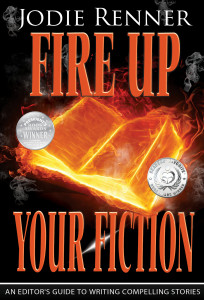 by Jodie Renner, editor & author
by Jodie Renner, editor & author
After your first (or second or third) draft, it’s time to go through your manuscript to cut out any unneeded words that are just cluttering it up.
Wordiness muddles your message, slows down the momentum, and drags an anchor through the forward movement of your story. It also reduces tension, anticipation, and intrigue, all essential for keeping readers glued to your book.
Wordiness gets in the way of a free, easy, natural narrative flow and wrenches your readers out of the fictive dream by subliminally irritating them and making them wonder if there are better ways to use their time.
Here’s an example of minor wordiness that disrupts the flow and slows down the pace. This is a well-disguised passage from my editing of a few years ago. For the “Suggested changes” section, I’ve crossed through all words to be removed and underlined words added, and I changed the font color to red, to imitate Track Changes, which most editors use these days. My notes and comments are in italics.
Genre: crime fiction
Setup: McRae is a homicide detective who’s just arrived to search the home of a murder victim and begin questioning neighbors. He’s speaking to a young man named Rod who lives next door.
Original excerpt:
McRae asked, “Why would you lie to me? Are you hiding something, Rod?”
Rod’s eyes involuntarily traveled to the porch lamp by the door.
McRae fought a smile as he realized he hadn’t looked there for a spare house key. He stretched his right hand up and felt a small box of some sort. He pulled it loose and saw it was a magnetic case of the kind used to hide spare keys. He slid the top back and the key was missing from inside.
McRae extended his palm out, and Rod seemed to deflate. Rod reached into his jacket pocket and produced a brass key.
McRae turned to his partner. “Let’s check the nearby neighbors ourselves,” McRae said, and looked around. “They’re mostly retirees in this complex, so they should have been home last night,” McRae suggested. “If he was killed somewhere besides in his own home, we have to find that place, and finding his car might tell us something about where he was before he was killed.”
If no one saw him leave, they would have to assume the murder took place inside Norm’s home. There was no evidence of a crime having taken place there, but the missing car presented another set of theories.
Suggested changes:
A tighter final version:
McRae asked, “Why would you lie to me? Are you hiding something, Rod?”
Rod’s eyes flicked to the porch lamp.
McRae fought a smile as he realized he hadn’t looked there for a spare house key. He reached up and felt a small metal box. He pulled it loose and slid the top back. No key.
McRae turned to his partner. “Let’s check the nearby neighbors ourselves.” He looked around. “Mostly retirees, so they should have been home last night. If he was killed somewhere else, finding his car might give us some clues.”
If no one saw him leave, they’d have to assume the murder took place inside Norm’s home. It didn’t look like it, and the missing car presented another set of theories.
By cutting back on the wordiness, we’ve not only picked up the pace and made the narrative flow more effortlessly; we’ve also deepened characterization of the detective. The original, more stilted version seemed like the author telling us things, whereas in this final, more relaxed version, the wording keeps us firmly in the point of view and voice of this busy male homicide detective.
So look for all those “little word pile-ups” in your manuscript and see if you can smooth out the sentences by deleting extra words. The end result should be not only faster pacing and more tension, but will be much closer to how that character would actually speak and think.
 Do any of you have any before-and-after examples to share of tightening up your writing? Leave them in the comments below!
Do any of you have any before-and-after examples to share of tightening up your writing? Leave them in the comments below!
~ Captivate Your Readers – An Editor’s Guide to Writing Compelling Fiction Amazon.com Amazon.ca Amazon.co.uk
